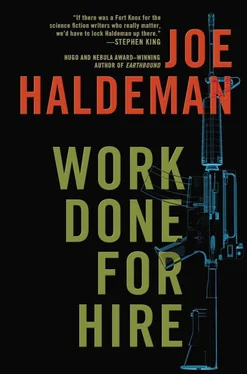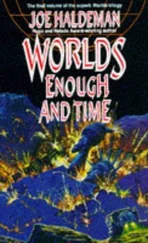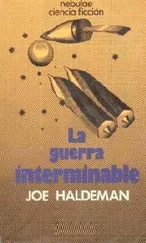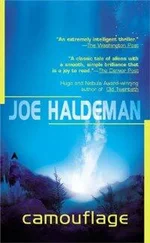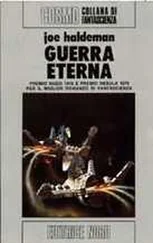He wouldn’t do it that way again. It was nice to have the blood, but the out-of-control disorder was vulgar.
When he made the long ventral incision, she was so close to being dead that she hardly reacted, just flinching. Before he cut her down, he severed the intestines at ileum and rectum, and laid them out in a neat circle around the locus where she was hanging, which remedied some of the randomness. He separated the edible parts from the steaming pile of offal and sealed them in plastic bags, which he set on the block of ice in the cooler.
She was a little too large to fit into the cooler until he took out the ice block and jointed her. Then he split the ice into eight chunks and arranged them in various hollows, and propped the bucket upright inside her circled arms.
Before moving the ice chest, he took the shotgun and went out the cabin’s back door, and silently reconnoitered. The rain had stopped and the forest was utterly quiet.
He found the remains of a rabbit that had been torn apart, probably by a hawk, and smiled in empathy. He thought of what was inside the cooler and his stomach growled.
The rain stopped abruptly just after 10:00. I finished the chapter I’d been working on, rolled up my gear, and punched the phone for automatic checkout. Figured I could cover half the distance to Des Moines before lunch if I poured on the coal.
Perfect weather and road. Cool fresh-washed air and pebbly asphalt that hadn’t gone through too many Iowa winters.
Sometimes the bicycle is a perfect place to think. Maybe the rhythm and slight exertion. But especially like this, with no distractions from weather or traffic—the mind roams and grazes. Not a mind-set for doing the taxes or solving scholarly problems, but good for free association and inspiration.
So what would Hunter be if I were writing the story free of constraints from the script? Like this last chapter. That went easily and was pretty interesting. Pretty good writing.
How close did the book really have to be to the movie?
Well, the movie didn’t actually exist yet, as a movie. They were supposed to start shooting July first, two weeks before the book was due. They were going to wrap the movie six weeks later, 15 August. That date was set in stone; another company would be moving into the studio the next day.
My contract required me to rewrite the novelization if there were “fundamental” changes between the script and the movie. I hadn’t minded agreeing to that clause—hell, if I had to write the whole novel over, it was still a fortune compared to real fiction.
But wait. Consider the obverse—what if I made fundamental changes to the story myself? And delivered before shooting started? If they liked it better, they might use that version, or some part of it.
They wouldn’t pay me any more—talk about fantasy!—but it could enhance my reputation. And if they didn’t like it, how much work would it be to return it to Duquest’s original inspired version?
Barb Goldman said I’d be lucky if the Great Man even saw the first page of the book. Most likely it would go to the “script girl” (of whatever gender) or some similar minion, who would write up a page or two about it, to be filed and forgotten.
But what if the report said, “Hey, this is really good! Somebody should send it up to Duquest before he starts to shoot!”
Doesn’t hurt to dream. With a free hand, what about the script would I change?
The action really wouldn’t have to be that different. Maybe a little more believable. I was already taking some liberties with the characters, who were pretty cardboard in the script, and I had the studio’s blessing for that. When I talked to Duquest’s agent on the phone, what he said he wanted, in so many words, was “really good writing, just not too literary.” Sort of like really good soup, but without any seasoning.
What does a Hollywood guy mean by “literary”? Big words? No problem. Complex characterization? Keep it subtle. Layers of meaning? They won’t worry about the cake if the icing looks pretty.
As I’d told Kit, but of course hadn’t mentioned to the movie people, that was the most interesting aspect of the job; the most challenging: writing two books simultaneously, a literary one and a commercial one. The hat trick was that both novels were made up of the same sequence of words.
Maybe that was kind of quantum-mechanical? Like a particle being in two places at the same time. Though I could never get my literal-minded brain around that one, quite.
With writing it’s simple to do two things at once. The Marquis de Sade’s “novels” are masturbation adjuncts but also exquisitely detailed maps of a deranged mind examining itself. Ulysses is a microscopic deconstruction of one day in Dublin, but the same sequence of words adds up to a daring experiment in the limits of the novel form.
So my job was simple wordsmithing in comparison: write a good novel that follows someone else’s story line—like Ulysses , both Homer’s and Joyce’s, to go from the ridiculous to the sublime.
In theory, I could write two different versions, literary and commercial. But that way lies legal madness. The book will be a “work done for hire,” and is the sole property of Ronald Duquest. Once I cash the check, I’m out of the picture. If I tried to copyright a book with the same story and title, but better words, the people who owned the commercial version would not be amused. It’s probably a good life rule not to piss off people who keep lawyers on the payroll.
The new bike was very pleasant for the first fifteen miles or so, but somewhere between twenty and thirty I started to wonder about the wisdom of my choice. The “commuter” bike was exactly that, and its cushiony ride would be perfect for going back and forth to and from work. The softness of the ride ultimately came from your own muscles, though, pushing against springs. A road bike’s ride might be harder on your butt, but all the energy you expended went to getting you from point A to point B.
Maybe I could put that in the book. Our hero gets an oversprung commuter bike with the guy’s money, but goes back the next day for one that’s more practical for the long haul. Not in the script, but a nice bit of verisimilitude for bike-savvy readers.
The author of the book, unlike the character, doesn’t have an employer with a fat wallet. Well, they do have billions, but not for the peons who humbly till the literary soil for them. Not for the comfort of their butts.
It was worth a few miles of daydreaming. I’d only spent $500 on this bike, leaving $49,500 for other stuff like rent. Minus Barb’s 15 percent. A decent road bike would run about $1,500, and they’d probably give me $400 trade-in. Call it a thousand-dollar investment, finally, out of the fifty I was getting for the book.
I almost had myself convinced, but a reality check came creeping in. How often, in real life, would I do even ten miles in a day, let alone fifty or a hundred? Going to the 7-Eleven for a six-pack, I’d rather have this comfy blue Cambridge than a sexy hard-riding racer. And it would be really stupid to buy both—where would I put them? I wouldn’t even leave my Salvation Army junker locked up overnight outside my apartment. Even if nobody was desperate enough to steal it, kids liked to demonstrate their budding manliness by stomping on spokes—and frames, if they were big kids.
Even the one bike dominated my so-called living room. Two would make it look like a bike shop.
I did have a get-thee-behind-me-Satan moment as I pedaled wearily into the suburbs of Des Moines. Two Guys Bike Shoppe had a signboard out front saying THIS WEEKEND ONLY ALL CAMPYS 25% OFF LIST!!! A Campagnolo would be just the right level of wretched excess—a Caddy, but not a Rolls.
Читать дальше
